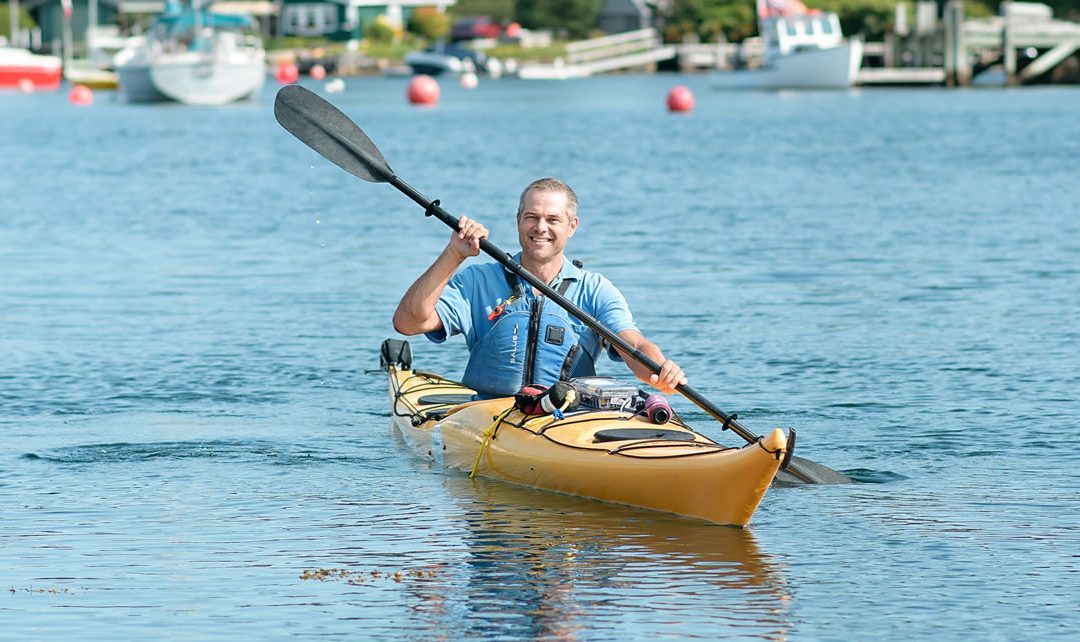Kayaks were created thousands of years ago by the Inuit of the northern Arctic regions, who used driftwood and seal-skin to create the low-to-the-water canoe-like boat for hunting and fishing. The stealth capabilities of the kayak, which means “hunter’s boat”, allowed the hunter to sneak up behind animals on the shoreline and successfully catch their prey.
Piers Baker owns a fleet of kayaks and there’s nothing sneaky about what he does with them. A sales rep with Duckworth Real Estate, on Nova Scotia’s South Shore, Baker shows oceanfront properties to hundreds of people each summer from the vantage point of a double, 22-foot-long plastic kayak worth $2,500. His $2,000 single kayaks are 17-feet-long.
As owner and manager of The Kayak Shack near his home in the village of Chester, in Lunenburg County, Baker’s popular and unique mode of transportation is a boon to his real estate career.
“An international component of people has been visiting Chester for over 100 years,” says the transplanted Ontarian. “Families from Florida to Baltimore came to this idyllic area in the summers for the cool ocean breezes and today their children, grandchildren and friends continue to come to this utopian seaside region.”
When he’s not showing inland offerings of 18th– or 19th-century homes, Victorian houses or contemporary buildings from Chester to Halifax, the 50-year-old entrepreneur guides summertime daily tours of kayak renters of four to eight people, and sometimes as many as 16 kayakers will join the flotilla. “My kayak business is a good way to target buyers,” he says. “I get to spend two hours with these people, getting to know them. If they spot one of my listings along the shore and inquire about it, I can tell them all about it in a relaxed way. It’s a soft-sell approach.”
Baker is new to the real estate business, having joined Duckworth’s four-person, 18-year-old boutique brokerage in January 2016. But he feels he has found his nirvana.
“I absolutely love it here,” he says. “I’m an avid wind surfer and I love the beauty of the Mahone Bay Islands, the sheltered coves and the people. This place puts Muskoka to shame!”
For 24 years, Baker was a celebrity disc jockey, managing Canada’s largest DJ company, Third From the Sun, based in Toronto. He worked celebrity parties for scores of luminaries, including Brad Pitt, Elton John and Stevie Wonder, and was the DJ for hundreds of parties for TV networks, major banks, large corporations and well-known Canadian families. But he says “the Toronto rat race” was taking its toll in terms of stress on him and his clothing-designer wife, Katherine.
“Toronto is competitive in an unnatural way,” he says. “The parties I worked had to be bigger and better than the year before. There was a cost to working so hard. Even my neighbourhood felt tense,” says the man who grew up in tony Rosedale and attended the exclusive Upper Canada College and Lakefield College. His great-great grandfather was Max Aitken, who became Lord Beaverbrook. Born in Maple, Ont. in 1879, Aitken was a Canadian-British business tycoon, politician, newspaper publisher and writer who was an influential figure in British society and who served in Prime Minister Winston Churchill’s cabinet in 1940.
In 2012, Baker, by now a seasoned corporate marketing and business development professional, decided to “step back and decompress.” He and his wife and two children, Max, now 9, and Isabella, 12, moved to Nova Scotia, famous for its rugged coastline, sandy beaches, pounding surf and lighthouses.
“I always thought real estate would be a good fit for me,” he says from his home in Chester. He also owns a home in Halifax and owns and manages commercial properties in Chester and one in Port Hope, Ont.
Nova Scotia was an obvious choice for Baker in which to live and work since he and his family had been spending summers in Chester since 1967. He was attending Dalhousie University in Halifax when he started his DJ company.
He enjoys the more relaxed atmosphere of working for Duckworth, which has an office in a restored 18th-century English barn in the historic seaside village of Kingsburg, 25 km from Lunenburg.
“It takes patience to sell oceanfront properties, ocean-view homes and undeveloped land in this part of Nova Scotia,” he says. “One has to be willing to work with the property owner for a longer period of time than you would in Toronto. It means building a relationship with a client over time.” He admits it’s something he is comfortable doing and he encourages clients to “soak in the beauty of the area and capture its essence.”
Baker says most of his buyers are from Halifax and are looking for a solid investment “in the peninsula.” Most of the properties are secondary or seasonal properties and he concedes there aren’t as many U.S. buyers fleeing the political turmoil of our neighbouring country as he would have thought. He adds that many clients don’t buy during the high summer season, but wait for fall or winter when they think the seller is more motivated and maybe not willing to carry a house or cottage through the winter.
When asked what qualities are required to sell oceanfront properties, Baker says knowledge of the area is paramount. “One needs to know about septic systems, municipal bylaws and how to work with the people at the Department of Natural Resources if you want to build a wharf, or if you want to build a guest house, for example.” He adds that as an area resident, he can tell a potential homebuilder which direction the storms will come in.
Baker would agree that his many years working as a DJ has helped him in his current career. He’s still working with a live audience – it’s just smaller and more relaxed.
Dennis McCloskey is a contributing writer for REM.





















